#CompTIA Network+ Certification
Text
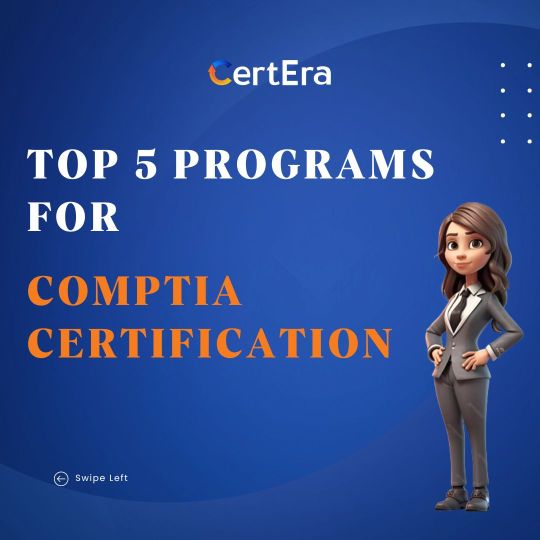
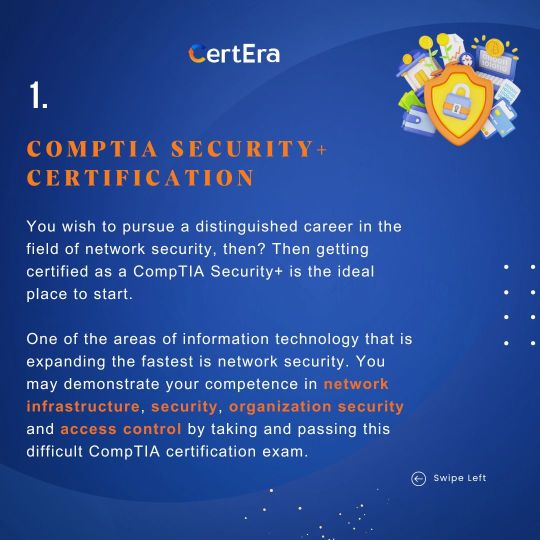

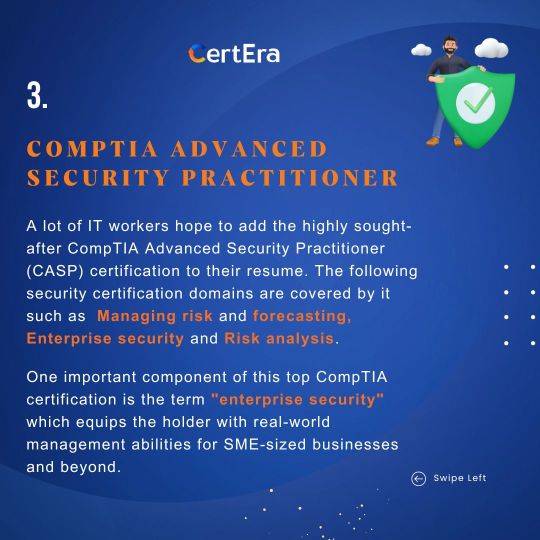
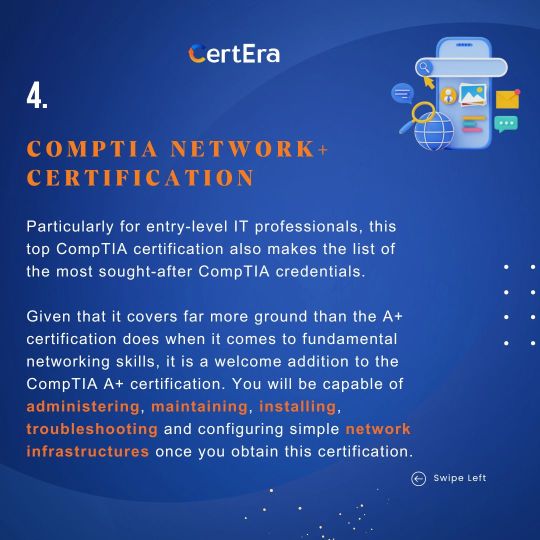
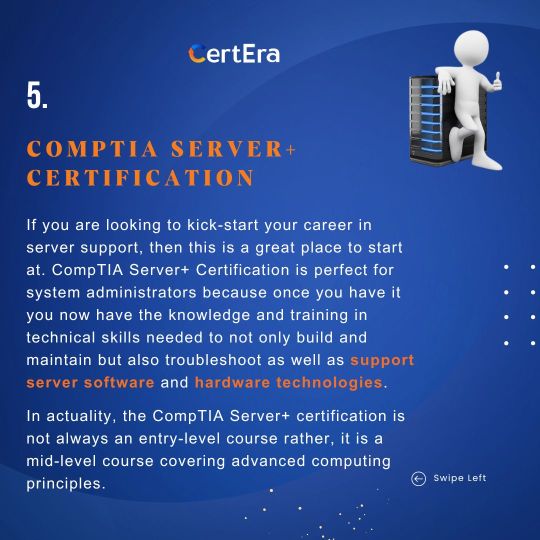
check out the Top 5 Programs for CompTIA Certification
“Unlock Your Career Potential: Enroll Now with Certera for Accelerated Growth!”
Visit our website for more information or to explore the courses.
Follow us on LinkedIn, X, YouTube and Instagram.
#CompTIA Security+ Certification#CompTIA A+ certification#CompTIA Advanced Security Practitioner#CompTIA Network+ Certification#CompTIA Server+ Certification
0 notes
Text
CompTIA Network+ certification
CompTIA Network+ certificate helps you begin a career in IT infrastructure and covers network configuration skills. Network+ certification validates your knowledge as a networking professional and demonstrates a wide range of skills required in today's network environments.
0 notes
Text






COMPTIA A+ 📂 $40
Network+ 📁 $40
Security + 📂 $40
CYSA+ 📂 $40
🔰GOOGLE DRIVE LINK 🔗
📖 2 PDF BOOKS Instructor + Student
🖥️Slides for EACH CHAPTER
📄Exam PREP
5 notes
·
View notes
Text
Pass your IT certification test! Get video courses covering A+, Google Cloud, CCNA, and more!
Pass your IT certification test! Get video courses covering A+, Google Cloud, CCNA, and more! #sale #comptia #education #cisco #learning #google #paloaltonetworks #itcertification #network
Here’s the link to check out the three bundle options with up to 18 items.
Looking to upskill into the IT world? Or want to make your qualifications bulletproof to potential employers? This bundle of video courses from Packt is designed to get you ready for a wide range of IT certifications! You’ll get access to a host of expert-led courses covering essential certification tests from CompTIA,…

View On WordPress
#certification#chinese#cisco#comptia#education#google#humble bundle#it certification#learn chinese#learning#pal alto networks#sale
0 notes
Text
Bangalore is a hub for IT companies, startups, and multinational corporations, making it an ideal location to study and work in the field of cybersecurity. The city boasts numerous educational institutions and training centers that offer comprehensive cybersecurity courses to cater to the growing demand for cybersecurity professionals.
#Course Bundles in India#Computer Support in Pune#Cybersecurity Courses in Banglore#Cybersecurity Courses Online#Networking Certifications in Hyderabad#CompTIA Courses Online in India#Microsoft Courses in India#Cisco Courses in Mumbai#Database Systems in pune#Blockchain Courses in Delhi#Programming DevOps in Banglore#Google Certifications in Pune#Google Certifications Online#Cloud Computing in Mumbai#Business & Management in India#Adobe Courses in Mumbai#Design Courses in Pune#Business Productivity in Banglore#Social Media Marketing in India#Microsoft Courses in Online
1 note
·
View note
Text

LOL I forgot about this. I got my A+ in 2009, before the 2010 cut over to expiring certs that you needed to renew every year. So it is still valid!
Brought to you by employers who somehow think that System Administrators are likely to keep up A+ and Network+ certs...
(I mean yeah some might, but it's gotta be pretty rare. A+ is the bare bones, "this person can do basic IT help desk" cert.)
#CompTIA#A+#Network+#fine certs for people starting out#not usually too applicable later in career#certifications#right now I need my RHSA/RHCE and CKA#computers#my posts
1 note
·
View note
Text
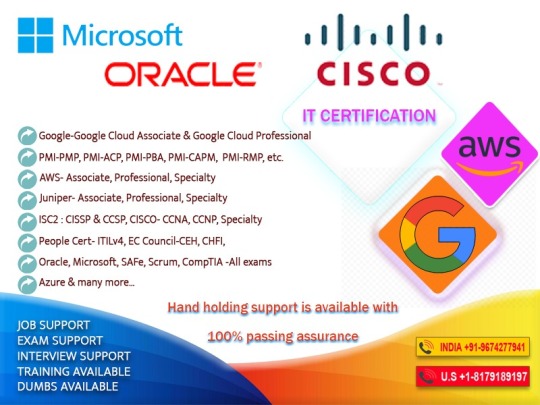
#ccna course#cisco ccna#pmp course#ccna training#formation pmp#comptia#ccna certification#aws#network#microsoft#chfi#pmp exam#ccna
0 notes
Note
Please tell us how to get into IT without a degree! I have an interview for a small tech company this week and I’m going in as admin but as things expand I can bootstrap into a better role and I’d really appreciate knowing what skills are likely to be crucial for making that pivot.
Absolutely!! You'd be in a great position to switch to IT, since as an admin, you'd already have some familiarity with the systems and with the workplace in general. Moving between roles is easier in a smaller workplace, too.
So, this is a semi-brief guide to getting an entry-level position, for someone with zero IT experience. That position is almost always going to be help desk. You've probably heard a lot of shit about help desk, but I've always enjoyed it.
So, here we go! How to get into IT for beginners!
The most important thing on your resume will be
✨~🌟Certifications!!🌟~✨
Studying for certs can teach you a lot, especially if you're entirely new to the field. But they're also really important for getting interviews. Lots of jobs will require a cert or degree, and even if you have 5 years of experience doing exactly what the job description is, without one of those the ATS will shunt your resume into a black hole and neither HR or the IT manager will see it.
First, I recommend getting the CompTIA A+. This will teach you the basics of how the parts of a computer work together - hardware, software, how networking works, how operating systems work, troubleshooting skills, etc. If you don't have a specific area of IT you're interested in, this is REQUIRED. Even if you do, I suggest you get this cert just to get your foot in the door.
I recommend the CompTIA certs in general. They'll give you a good baseline and look good on your resume. I only got the A+ and the Network+, so can't speak for the other exams, but they weren't too tough.
If you're more into development or cybersecurity, check out these roadmaps. You'll still benefit from working help desk while pursuing one of those career paths.
The next most important thing is
🔥🔥Customer service & soft skills🔥🔥
Sorry about that.
I was hired for my first ever IT role on the strength of my interview. I definitely wasn't the only candidate with an A+, but I was the only one who knew how to handle customers (aka end-users). Which is, basically, be polite, make the end-user feel listened to, and don't make them feel stupid. It is ASTOUNDING how many IT people can't do that. I've worked with so many IT people who couldn't hide their scorn or impatience when dealing with non-tech-savvy coworkers.
Please note that you don't need to be a social butterfly or even that socially adept. I'm autistic and learned all my social skills by rote (I literally have flowcharts for social interactions), and I was still exceptional by IT standards.
Third thing, which is more for you than for your resume (although it helps):
🎇Do your own projects🎇
This is both the most and least important thing you can do for your IT career. Least important because this will have the smallest impact on your resume. Most important because this will help you learn (and figure out if IT is actually what you want to do).
The certs and interview might get you a job, but when it comes to doing your job well, hands-on experience is absolutely essential. Here are a few ideas for the complete beginner. Resources linked at the bottom.
Start using the command line. This is called Terminal on Mac and Linux. Use it for things as simple as navigating through file directories, opening apps, testing your connection, that kind of thing. The goal is to get used to using the command line, because you will use it professionally.
Build your own PC. This may sound really intimidating, but I swear it's easy! This is going to be cheaper than buying a prebuilt tower or gaming PC, and you'll learn a ton in the bargain.
Repair old PCs. If you don't want to or can't afford to build your own PC, look for cheap computers on Craiglist, secondhand stores, or elsewhere. I know a lot of universities will sell old technology for cheap. Try to buy a few and make a functioning computer out of parts, or just get one so you can feel comfortable working in the guts of a PC.
Learn Powershell or shell scripting. If you're comfortable with the command line already or just want to jump in the deep end, use scripts to automate tasks on your PC. I found this harder to do for myself than for work, because I mostly use my computer for web browsing. However, there are tons of projects out there for you to try!
Play around with a Raspberry Pi. These are mini-computers ranging from $15-$150+ and are great to experiment with. I've made a media server and a Pi hole (network-wide ad blocking) which were both fun and not too tough. If you're into torrenting, try making a seedbox!
Install Linux on your primary computer. I know, I know - I'm one of those people. But seriously, nothing will teach you more quickly than having to compile drivers through the command line so your Bluetooth headphones will work. Warning: this gets really annoying if you just want your computer to work. Dual-booting is advised.
If this sounds intimidating, that's totally normal. It is intimidating! You're going to have to do a ton of troubleshooting and things will almost never work properly on your first few projects. That is part of the fun!
Resources
Resources I've tried and liked are marked with an asterisk*
Professor Messor's Free A+ Training Course*
PC Building Simulator 2 (video game)
How to build a PC (video)
PC Part Picker (website)*
CompTIA A+ courses on Udemy
50 Basic Windows Commands with Examples*
Mac Terminal Commands Cheat Sheet
Powershell in a Month of Lunches (video series)
Getting Started with Linux (tutorial)* Note: this site is my favorite Linux resource, I highly recommend it.
Getting Started with Raspberry Pi
Raspberry Pi Projects for Beginners
/r/ITCareerQuestions*
Ask A Manager (advice blog on workplace etiquette and more)*
Reddit is helpful for tech questions in general. I have some other resources that involve sailing the seas; feel free to DM me or send an ask I can answer privately.
Tips
DO NOT work at an MSP. That stands for Managed Service Provider, and it's basically an IT department which companies contract to provide tech services. I recommend staying away from them. It's way better to work in an IT department where the end users are your coworkers, not your customers.
DO NOT trust remote entry-level IT jobs. At entry level, part of your job is schlepping around hardware and fixing PCs. A fully-remote position will almost definitely be a call center.
DO write a cover letter. YMMV on this, but every employer I've had has mentioned my cover letter as a reason to hire me.
DO ask your employer to pay for your certs. This applies only to people who either plan to move into IT in the same company, or are already in IT but want more certs.
DO NOT work anywhere without at least one woman in the department. My litmus test is two women, actually, but YMMV. If there is no woman in the department in 2024, and the department is more than 5 people, there is a reason why no women work there.
DO have patience with yourself and keep an open mind! Maybe this is just me, but if I can't do something right the first time, or if I don't love it right away, I get very discouraged. Remember that making mistakes is part of the process, and that IT is a huge field which ranges from UX design to hardware repair. There are tons of directions to go once you've got a little experience!
Disclaimer: this is based on my experience in my area of the US. Things may be different elsewhere, esp. outside of the US.
I hope this is helpful! Let me know if you have more questions!
41 notes
·
View notes
Text
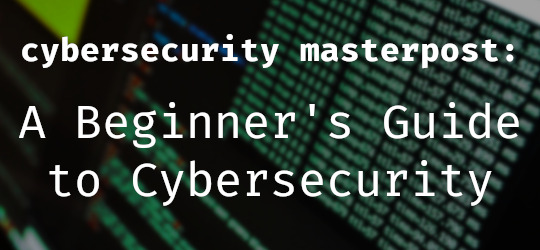
A Beginner's Guide to Learning Cybersecurity
I created this post for the Studyblr Masterpost Jam, check out the tag for more cool masterposts from folks in the studyblr community!
(Side note: this post is aimed towards the technical side of security, rather than the governance/management side, because the tech stuff is what I'm familiar with.)
Where do I start?
Cybersecurity is a specialization of general tech & therefore builds on some concepts that you'll need to know before you can dive deep into security. It's good to have a background in and understand:
how computers & operating systems work
how to use Linux
computer networking & basic protocols
If you're serious about learning cybersecurity, it can be helpful to look at certifications. Even if you don't want to get certified or take the exam (they can get expensive), they provide you with a list of topics that you can use to guide your self-study. And if you want to find a job, a certification is practically required for getting your foot in the door.
I personally recommend the CompTIA series of certifications, because they're well-recognized and I think they expose you to a good breadth and depth of material to get you started. Start with the A+ certification if you have zero tech background. Start with the Network+ certification if you've never taken a networking course. Once you get your basic computer and networking knowledge down, then you can jump into security. The Security+ is a good starting point.
Do I need to know how to code?
No, but it would be really really helpful. You don't have to be a skilled software engineer, but understanding the basics and being able to write small scripts will give you a solid foundation.
From Daniel Miessler's post How to Build a Cybersecurity Career:
You can get a job without being a programmer. You can even get a good job. And you can even get promoted to management. But you won’t ever hit the elite levels of infosec if you cannot build things. Websites. Tools. Proofs of concept. Etc.
If you can’t code, you’ll always be dependent on those who can.
How do I gain skills?
Play Capture the Flag (CTF) games.
Stay up to date with security news via an RSS reader, podcasts, or whatever works for you. Research terms that you're unfamiliar with.
Watch conference talks that get uploaded to YouTube.
Spin up a VM to practice working with tools and experiment on your own computer.
There are lots of brilliant, generous people in cybersecurity who share their knowledge and advice for free. Find their blogs, podcasts, and YouTube channels. Look for local meetups in your area.
I'm still relatively new to the field, but I have a general knowledge of lots of different things, so feel free to send me an ask and I can probably help point you to some resources. We're all in this together!
Previous Cybersecurity Masterposts
An Introduction to Cybersecurity
Cybersecurity Book Masterpost
Free Cybersecurity Learning Resources Masterpost
Masterpost of Study Tips for Cybersecurity
Cybersecurity Tools Masterpost
Thank you so much to everyone who participated in the #StudyblrMasterpostJam this week! It was wonderful to see what other studyblr folks are passionate about. The jam technically ends today but there are no official rules, so if you've been thinking about writing a masterpost, this is your sign!
19 notes
·
View notes
Text
i’ve been very inactive, so here’s an update on my life:
i got a new job and now make double of what i was making. it’s 5 minutes from where i moved out to, gives me free internet and television, and my job is paying for me to take IT courses like comptia IT fundamentals, a+, network+, security+, cyber security+, pentest+ (ethical hacking), and so on to get me any certification i want. they will also pay to put me through college. i like this job. [:
also the medication i take for my hypersomnia went missing so i have had 0 spoons and have been very sleepy for months now. i got 0 energy.

7 notes
·
View notes
Text
H-A-M (Hustle And Motivate) presents: Mental Hellth 2
How important it is to be able to talk about mental health in music and in life in general

Dedicated to:
"This song is to address unethical treatment of customers and patients in hospitals. Be sure to peep part 1 in the Mental Hellth series as well".
Listen in Spotify:
BIO:
Hamlet Bent Jr aka "Ham"(note I AM Vegetarian/vegan...See Soylent Green, some people are not mean. ) as called by friends and family, was born in Queens New York in the late 70's. I grew up listening to emcee's explaining life situations in rhymes. My first "teachers" from Hip Hop music were like Rakim, KRS One and BDP, Big Daddy Kane, Public Enemy, Ice T, NWA, MC Lyte, Queen Latifah, Salt N Peppa, Heavy D, Pete Rock, etc. (My apologies for leaving out a lot of others, it's just that the memory ain't what it used to be...😎). So, yeah some people just think of this as music, but really what was being done in Hip Hop was an educational movement. These forces assisted in making me the man that I am today.
instagram
My Networking and Technology experience includes working in IT for the past 20 years for various organizations. As far as certifications, I do hold a couple (ex. Cisco CCNA, Comptia Security, Network, A, ITF, +, LPI, Various Google Coursera certs). I have worked on networks since the days of 56K Modems and T-1 carrier lines. Now I see mostly cable and fiber optic networks, which if you peep my songs I do talk about my experience a little
Check this link for more music:
3 notes
·
View notes
Text
i recently got my comptia a+!!!! i'm one step closer to being a network engineer :')
now i'm going for a lpi linux essentials certification, which shouldn't be too bad? gAH hoping for the best.
4 notes
·
View notes
Text

Hello, this week's first task is completed! I was enrolled in CompTIA a+_ network Specialization and completed Module 1. You all must have heard of CompTIA. It offers various certificates for those who want to start their IT career. I wanted to access this from Coursera and I found two courses that would be useful to me. One is CompTIA a+_ network Specialization, the other is CompTIA a+_ cyber Specialization.
To briefly talk about the first module I completed, I learned basic Network Protocols, Windows PC management tools, basic security management in Windows and completed the first module by completing the lab at the end of the course!
Course links:
CompTIA a+_ network Specialization
CompTIA a+_ cyber Specialization
7 notes
·
View notes
Text
Study for your tech certification with these guides from Pearson
Study for your tech certification with these guides from Pearson #sale #techcertification #ccna #comptia #cisco #aws #cissp #certification #study #education #learning #pearson
Use this link to check out the book bundle options.
Preparing for a tech certification exam to advance your career? Get ready—and don’t sweat it—with the help of these practical study resources from Pearson! The guides in this bundle cover a range of the most popular certifications, including Cisco CCNA, CompTIA Network+, CISSP, AWS Solutions Architect, and more networking, security, and IT…

View On WordPress
#book#books#ccna#ceh#certification#cisco#comptia#ebook#ebooks#humble bundle#network#networking#security#tech certification
0 notes
Text
Can you explain the differences between A+, Network+, and Security+ certifications from CompTIA? Which certification is considered more valuable and why?
Certainly! CompTIA offers several certifications that are widely recognized in the IT industry. A+, Network+, and Security+ are three of the most popular certifications, each focusing on different areas of IT. Here's a breakdown of each:
A+ Certification:
Focus: This certification is geared towards entry-level IT professionals and covers foundational skills in IT hardware, software, networking, and troubleshooting.
Topics: A+ covers areas such as PC hardware, operating systems (Windows, Linux, macOS), networking, mobile devices, security, and troubleshooting.
Job Roles: A+ certification holders often work in roles such as technical support specialists, help desk technicians, and field service technicians.
Value: A+ is valuable for individuals starting their IT careers as it provides a solid foundation of IT knowledge and skills. It's often a prerequisite for more advanced certifications.
Network+ Certification:
Focus: Network+ focuses specifically on networking concepts and skills required for IT professionals working with networks, both wired and wireless.
Topics: Network+ covers areas such as network technologies, installation and configuration, media and topologies, management, security, and troubleshooting.
Job Roles: Network+ certification holders typically work in roles such as network administrators, network technicians, and systems engineers.
Value: Network+ is valuable for individuals seeking to specialize in networking. It provides a comprehensive understanding of networking fundamentals and is recognized by employers as validation of networking knowledge and skills.
Security+ Certification:
Focus: Security+ is focused on cybersecurity concepts and skills, covering best practices in securing networks, systems, and applications.
Topics: Security+ covers areas such as network security, compliance and operational security, threats and vulnerabilities, application, data, and host security, access control, identity management, and cryptography.
Job Roles: Security+ certification holders often work in roles such as security analysts, security specialists, security administrators, and network security engineers.
Value: Security+ is highly valuable in today's cybersecurity landscape. It demonstrates proficiency in cybersecurity principles and practices and is often required or recommended for cybersecurity-related roles.
In terms of which certification is considered more valuable, it largely depends on your career goals and the specific job role you're targeting. However, comptia Security+ certification is often regarded as more valuable in terms of salary and job prospects due to the increasing demand for cybersecurity professionals and the critical importance of cybersecurity in modern IT environments. That said, all three certifications have their own merit and can be valuable depending on your career path and interests.
#online certification and training#cybersecuritycourse#comptia security plus#comptia#comptiasecuritypluscertification
5 notes
·
View notes
Note
do you have any advice for finding an entry level compsci job? I'm still working on my BS and my non- job related experience hasn't been enough 😕
(not picky about any specific area)
Hi!
So I assume the US, right? (I'm European and our market is different here).
If I were a student here is how I would do it:
Create a resume and really pump your soft skills like team work and project management;
If your university offers them I'd join a club of an area of your interest such as coding, robotics, hacking... I know it feels like a waste of time, but it's still experience, regardless of the result (you don't have to win any competition to show your skills, counterintuitive I know), you will be able to show that you successfully dealt with a complicated project. That's a thing that when I was doing my rounds of interview were highly considered. You can always learn this or that language of programming but they already want a team player and one that's not afraid to take the reins when needed. If your university doesn't offer them there are online teams (or you can set up one by yourself) that do the same thing. For example I do a lot of "capture the flags", hacking challenges. They are a fun, challenging way to learn something, network with others and show how good you are.
A lot of companies (at least mine and few others in Europe did!) have these paid internships where they will teach you a job. This is a good way to get a foot in the door in cybersecurity since a lot of time even a compsci degree won't teach you anything about the subject. And training an analyst from scratch is extremely expensive, so you also have leverage for negotiating once your internship is over;
Consider taking a comptia certification! I recommend them for beginners because they are relatively cheap and are widely recognised. Comptia A+ is a good addition to a student's resume. The "three basics" comptia certifications are: A+ (for general IT), network+ and security+. They are ~300$/each.
I think I've covered most of it. You could also do a portfolio if coding is your thing, but I don't know anything about it.
Also I always suggest sending a resume if you hit 70% of what's requested, not 100%.
Plus! There are few professional associations that can help you locally! In Europe we have the Women4Cyber initiative. They will give you training, consultations etc about your career. I unfortunately don't know if there is an American one.
I hope this helps!
10 notes
·
View notes